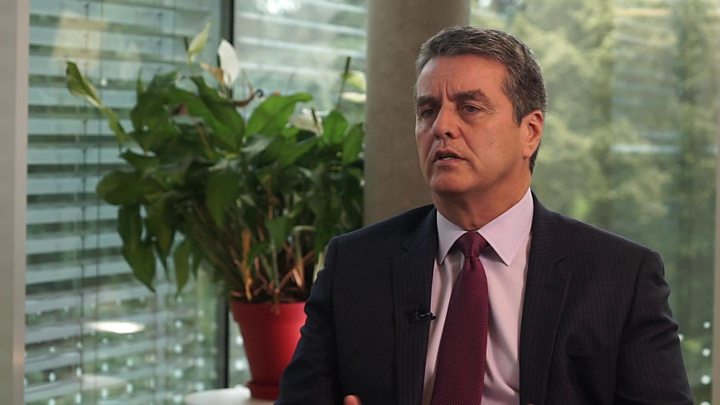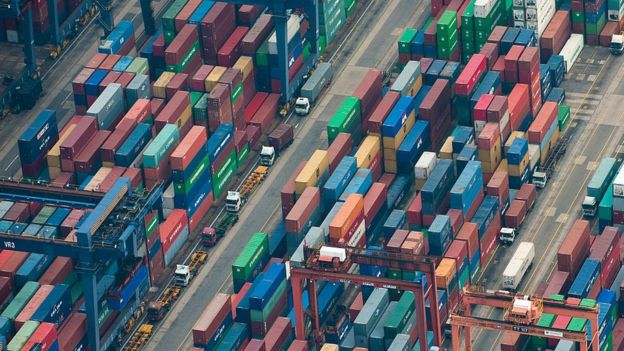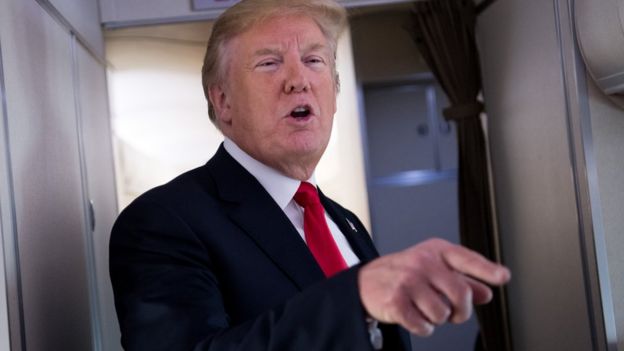Kamal Ahmed
 Global economic growth is under threat as the world's economic super powers trade tit-for-tat trade sanctions, according to the World Trade Organization. In its most sober assessment of the growing tariff war between the US, European Union and China, the WTO said the global system of agreed trade rules was at "potentially large risk". It said world economic growth was "in jeopardy" and pleaded for a "de-escalation". The threat of a tariff war was sparked after US President Donald Trump ordered tariffs on steel and aluminium imports from the EU and China.
Global economic growth is under threat as the world's economic super powers trade tit-for-tat trade sanctions, according to the World Trade Organization. In its most sober assessment of the growing tariff war between the US, European Union and China, the WTO said the global system of agreed trade rules was at "potentially large risk". It said world economic growth was "in jeopardy" and pleaded for a "de-escalation". The threat of a tariff war was sparked after US President Donald Trump ordered tariffs on steel and aluminium imports from the EU and China.
The President said he was acting to protect American jobs and that global free trade deals had been "very, very bad" for the US.
Both China and the EU responded with the threat of import tariffs on US cars and agricultural goods totalling hundreds of billions of pounds.
Economists have warned that previous trade wars - such as during the 1930s recession - have exacerbated economic problems and that they lead to higher prices and lost jobs.
"The worrying trend is the increase in trade restrictive measures which has come at a time of increasing trade tensions and associated rhetoric," the WTO said in its report on trade between the 20 largest economies in the world - including the UK, the US, China and India, a group of countries also known as the G20.
"This should be of real concern to the international community."
 Image copyrightGETTY IMAGES
Image copyrightGETTY IMAGES
Trade restrictions
The report on the seven months between October 2017 and May 2018 said that G20 countries imposed 39 new "trade restrictive" measures including taxes on imports.
That was double the number of the previous report.
It said the new sanctions affected $74.1bn (£56.2bn) of trade - one and half times higher than over the same period a year earlier.
The number of "trade facilitation" measures - which lower barriers between countries - totalled 47, affecting $82.7bn of trade.
That was half the value of the same period a year earlier.
The WTO said: "At a juncture where the global economy is finally beginning to generate sustained economic momentum following the financial crisis, the uncertainty created by a proliferation of trade restrictive practices could place the economic recovery in jeopardy."
"Further escalation could carry potentially large risks for the system itself.
"The G20 economies must use all means at their disposal to de-escalate the situation and promote further trade recovery."
 Image copyrightGETTY IMAGESImage captionPresident Trump has said WTO rules discriminate against the US
Image copyrightGETTY IMAGESImage captionPresident Trump has said WTO rules discriminate against the US
Increased tensions
The warning from the WTO is likely to increase tensions with the US president who has said the present trade rules discriminate against the US, and has attacked the Geneva-based organisation which was launched in 1995 to encourage and police trade liberalisation.
The WTO does not agree with the US president's analysis, saying that fewer trade barriers support growth and jobs - not just for emerging market economies like China and India but for countries like the US as well.
Economic models show that lower import taxes tend to mean cheaper goods for consumers.
If China and the EU do follow through on their retaliatory threats, millions of American jobs linked to exports of food and cars, for example, could be put at risk, economists argue.
Recent threats
The think tank, Oxford Economics, said that recent threats of further sanctions by the US, the EU and China, could mean the extension of tariffs to a further 4% of world imports.
"We estimate tariffs have been imposed on on $60bn, 0.3%, of world trade so far, but this would rise to over $800bn of trade," it said.
"The current trade dispute risks worsening the 'creeping protectionism' trend visible since the 1990s.
"Lack of trade liberalisation has been especially notable among the advanced economies, where tariff levels remain stuck at early 2000s levels and both the US and EU impose significant non-tariff barriers."
Oxford Economics said that if the trade war escalates global growth could be cut by 0.4%, wiping hundreds of billions of pounds off the value of the world economy.
No comments:
Post a Comment